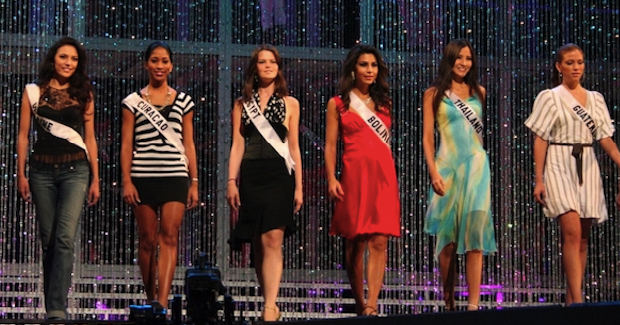Trump Brings Unity Through Feminism

The US election campaign plunged to new depths this week with the notorious Trump video and the second presidential debate. Democrats and Republicans were briefly unified in their criticism of the Republican presidential candidate. But what will be the lasting impact of what’s been dubbed “Pussygate“?
The story is old by now. Last Friday, a recording of Donald Trump bragging about how he kisses women and grabs their “pussies” without consent went viral. Tantamount to admitting and condoning sexual harassment and assault, the tape provoked a swift and stormy response.
Although Trump has his defenders, his comments have horrified many including those meant to be in his camp. His wife expressed her disapproval, as did his running mate Mike Pence who said he was praying for Trump’s family. For some high-profile Republicans, Trump’s comments were the last straw and they publicly disavowed him.
The episode has been a trigger for women everywhere who have endured the Donald Trumps of the world as part of Living While Female. Thousands of women have tweeted about the first time they were sexually assaulted. I had a text message exchange with a friend in which we remembered a high school science teacher who doubled as the school photographer. He took photos over the tops of locked toilet cubicles and underwater at swimming practice. On at least one occasion, when no one could see, he grabbed a girl. Everyone knew, and he continued without censure.
What that text message exchange and the public confessions from women have in common is rage and pain. Because the fact that Trump expressed his entitlement to female bodies, admitted to violating them, explained it away as “locker-room talk,” and is still a candidate for the highest office in the United States, reflects a culture in which men—whether they’re stars or not—get to behave sexually as they wish and women have to bear the consequences.
The episode that some commentators have called Pussygate has brought much-needed public attention and conversation to an issue that remains in the shadows. In the same year that Brock Turner served only three months of a pitifully short six-month prison sentence for raping an unconscious woman, and his father publicly complained that he shouldn’t be punished for life for “20 minutes of action,” it is heartening to see even staunch conservatives like Glenn Beck recognise Trump’s actions as wrong.
We might hope, as a result, that Pussygate will mark a new era in zero tolerance for sexual assault and even an end to Trump’s brand of narcissistic, abusive masculinity. We might hope that the Republican Party will change policies that seek to control women’s bodies. What an irony that in his remarks Trump has managed to unite people on opposite ends of the political spectrum, and over a feminist issue at that.
But there’s another and far more unpleasant way to read much of the reaction against Trump at this moment, and that is as a cynical and opportunistic deployment of caring about women in order to crush Trump. After all, women’s rights haven’t seemed to matter all that much in Trump’s campaign to date. As a presidential candidate he’s said many misogynistic things and they haven’t stopped the Republican Party from endorsing Trump.
The party that wants to end women’s reproductive rights has ignored the story of how Trump raped his first wife in retaliation for plastic surgery gone wrong. The party of family values hasn’t cared that Trump has publicly commented on his sexual attraction to his daughter. And the stories swirling about his sexual relationships with underage girls seem only to have made him more virile and appealing to his fan base rather than identify him as the predator he is. Some might say that this is the first time there’s been unequivocal proof, but that’s a cop out. We didn’t need any more proof to know that Trump is what he is.
It’s not just Republicans but Democrats who enable him and the culture of silence about male sexual entitlement. The Democrats criticise Trump for calling the kettle black in his comments about Bill Clinton’s sexual behavior, and in doing so effectively absolve Bill Clinton from the way he abused his power for sexual advantage in at least one proven instance. Forgiving Bill Clinton is part of a widespread narrative that effectively asks us to ignore his “sexual indiscretions” and focus instead on his political contributions. The same goes for so many other men in positions of power; the list of them is too long even to begin. In the process, ordinary, everyday men who treat women similarly are validated in their actions.
However, even before last Friday’s video leak, Hillary Clinton’s campaign had been highlighting Trump’s comments about women to undermine his run for the White House. A television ad released in September intersperses images of different girls with footage of Trump making offensive comments about women. It asks the viewers “Is this the president we want for our daughters?”
Many of us don’t want to see Trump become president because he is unfit to hold political office. But attempts to hamstring him so far have been ineffective. Along the way, the Democrats have gained the moral high ground and as such have shifted a partisan order in place since the 1970s. The anti-Trump Republicans are using Pussygate to claw back that ground. The party that through its policies has waged a war against women, is now trying to use women to re-establish itself. The whole disgusting episode reminds me of the argument that the writer Arundhati Roy made in 2002 about how the US was presenting its war in Afghanistan as one about liberating women when it wasn’t about women at all.
Trump’s comments may turn voters away, but they won’t change the values or policies of the Grand Old Party. Trump is presented as an outlier, an aberration, when really he’s the logical manifestation of a party that prides itself on believing in a traditional gender hierarchy in which women come second to God, men and the state. Republican reactions to Pussygate are only about women inasmuch as women are weapons in a political war.
Don’t be fooled by the rhetoric.
Dr Rebecca Sheehan is a lecturer in US History at the US Studies Centre at the University of Sydney. Rebecca’s expertise includes US women’s history, feminist history, history of gender and sexuality and the history of social movements in the US.
This article is published under a Creative Commons Licence and may be republished with attribution.




